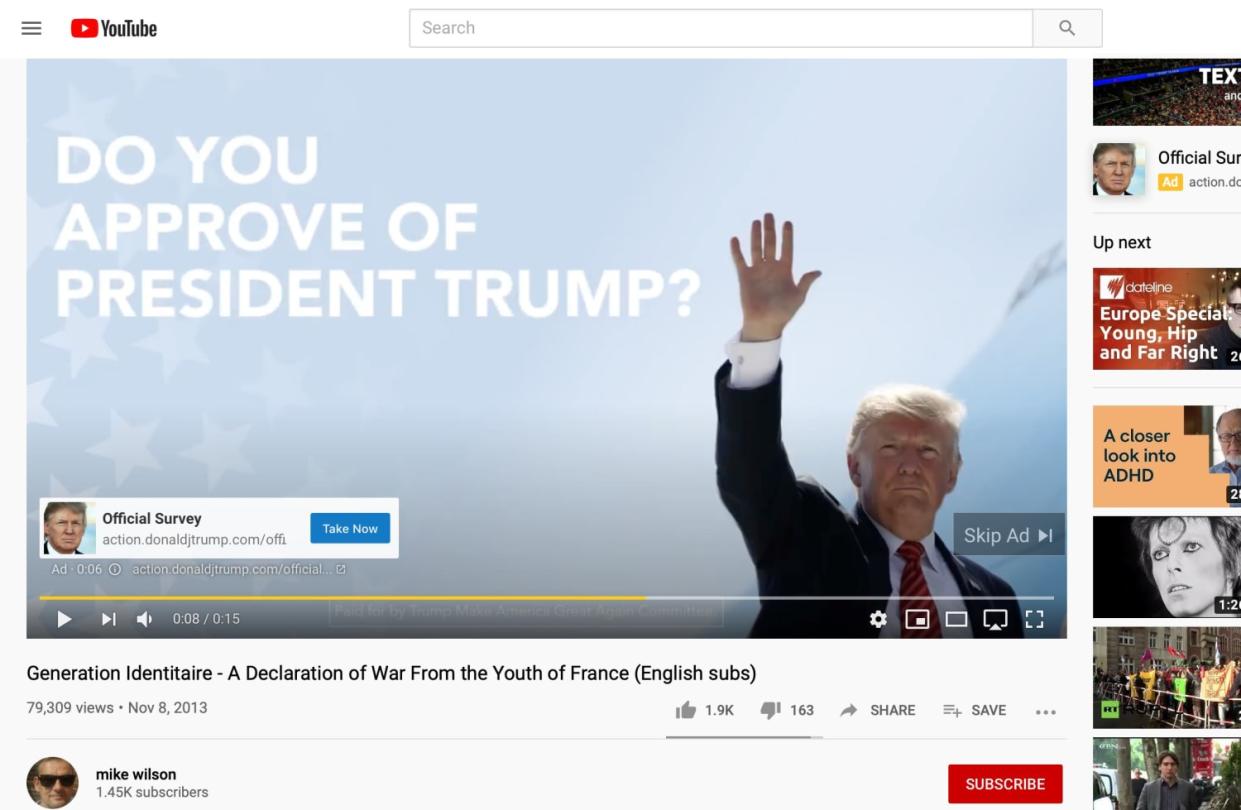Trump, Biden campaign ads show up on white nationalist YouTube content
Campaign ads for both President Donald Trump and Joe Biden are popping up on white nationalist videos on YouTube, underscoring the site's failure to crack down on extremist content, according to a report released Tuesday.
One video called "Generation Identity — A Declaration of War From the Youth of France" was preceded by ads for both the Biden and the Trump campaigns within the last month, according to the report by the nonprofit Global Project Against Hate and Extremism.
The black and white video shows close-ups of young men and women saying things like "We are the generation … of total failure of coexistence and forced mixing of races," speaking in French with English subtitles, with ominous music playing in the background.

"It appears that YouTube's ad algorithm is sloppy because there is no way the campaigns could want to be featured on hate content, especially foreign videos," said Heidi Beirich, co-author of the report that calls out YouTube and Twitter for providing a platform to white nationalists. "YouTube promises this won't happen but here it is."
A YouTube spokesperson said the video is not part of the YouTube partner program that allows users to monetize videos, and never should have had an ad run before it in the first place. "Any ad that ran against that specific video ran in error, and the error has since been resolved," according to the spokesperson.
The spokesperson added that political advertisers globally are only able to target their ads using age, gender, postal code and contextual information from users, and that a viewer sees an ad based on gender and age, general location and viewing habits.
A Biden campaign spokesperson called the situation "unacceptable" and called out YouTube's parent company Google.
"We will be demanding answers from Google on how our ads were played alongside this content and how we can be assured that it will never happen again," said Bill Russo, deputy communications director for the Biden campaign.
"Our campaign was launched to win the battle for the soul of our nation against the forces of hate, including those who spew white supremacist ideology. We aren't interested in catering to their hateful views."
Hogan Gidley, the Trump campaign's national press secretary, said: "We appreciate Google taking steps to ensure this doesn't happen."
Beirich, an expert on American and European extremism who spent 20 years at the Southern Poverty Law Center before launching the Global Project Against Hate and Extremism, says tech companies are responsible for the growth of white supremacists around the globe and must do more to curb extremist content.
In her report, Beirich and co-author Wendy Via focus on the Identitarian movement, also known as Generation Identity, an ideology based on the notion that people of European heritage are being "replaced" by immigrants.
"It would be inconceivable for social media platforms to allow ISIS propaganda to spread and grow unchecked, but that is exactly what is happening with identitarianism," the report says, in reference to the Islamic State militant group.
Just last month, YouTube suspended the accounts of a group of high-profile extremists, including the former Ku Klux Klan leader David Duke and the white nationalist Richard Spencer who helped found the American Identitarian group Identity Evropa.
A spokesperson for YouTube said the company has taken important steps to quash extremism, including updating its guidelines to better address supremacy that resulted in terminating over 25,000 channels for violating the companies hate speech policies.
But the new Global Project Against Hate and Extremism report says the site is still rife with white nationalist content.
The report found at least 12 countries represented by 31 Generation Identity chapters with about 86,000 subscribers, the report says. The group also identified 67 Twitter accounts for Generation Identity chapters in 14 countries with nearly 140,000 followers.
"The growth in the number of white supremacists worldwide can be laid at the feet of tech companies who allow this material to thrive on their platform," the report says. "It is time for this to end."
A Twitter spokesman wrote in an email that Twitter "has a hateful conduct policy that bans targeting someone on the basis of their race, religion, ethnicity, etc., and we've banned hundreds of domestic violent extremist groups under a dedicated policy, too."
"We remove 91% of terrorist content proactively; often before the accounts have even tweeted," the spokesperson wrote.
Martin Sellner, head of the Identitarian Movement Austria, has been permanently banned from the United Kingdom and had his visa to the United States revoked on the grounds that he inspires hate and represents a national security threat. But his YouTube channel has 25,000 subscribers.

YouTube said his channel is not in violation of its hate speech policy, which prohibits content that promotes violence or hatred against members of protected groups. Sellner's channel would have to violate the policy three times within a 90 day period to have the channel shut down.
"It's weird to allow content up from someone who has been declared a danger by security services in both the U.K. and the U.S.," Beirich said.
Sellner's channel was "demonetized" in 2019 for violating its advertising partnership policies, a move that barred him from earning revenues from ads running on his videos.
He acknowledged that he uses tech platforms like YouTube to raise bitcoin online.
Beirich and Via note that while revenues are small, some Identitarians make a cut from the revenue generated by advertisements placed on their YouTube content.
"It's one thing to put hate speech online. It's another thing to make money off of it," Beirich said.
Beirich and Via said that while Facebook has problems, the platform has done a good job of purging Identitarian content.
In a statement, Facebook said the platform bans groups that proclaim a hateful and violent mission. "Since 2018, we've banned chapters of the Generation Identity movement and continue to review additional individuals and chapters against our policy prohibiting dangerous organizations," a spokeswoman said.
In her report, Beirich draws a connection between Identitarian ideas like the fear of a "Great Replacement," and acts of violence like the 2019 Christchurch massacre in New Zealand in which a far-right extremist killed 51 people at two mosques.
The gunman had sent Sellner 1,500 euros in January 2018 and the two exchanged emails.
Sellner said the donation was made more than a year before the attack, and that he thanked the donor for the money via email as he does all his donors, and that he had no further contact with him after an exchange of pleasantries.
"There was no hint this guy one year later would commit this terrorist attack," he said.
The Austrian government investigated Sellner and did not file any charges against him.
But Beirich says people like Sellner are recruiting young people to extremist ideas.
"There's no difference between how this movement and its ideas are contributing to terrorism and a group like ISIS' ideas are leading to massive attacks," Beirich said.
"The most dangerous part about this is you're radicalizing young white men and that's how we end up with a Christchurch killer."
